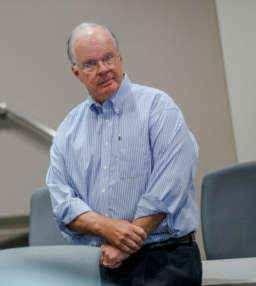
The Princeton Review, in partnership with Entrepreneur magazine, has ranked the MS in Innovation and Entrepreneurship (MSIE) program at the Naveen Jindal School of Management as one of the top schools for entrepreneurship in 2017.
The graduate program was ranked at No. 22 among more than 300 university entrepreneurship programs that were surveyed.
“There are multiple high-quality graduate entrepreneurship programs in the U.S., and we are delighted to be ranked in the top 25 by the Princeton Review,” said Jindal School Dean and Caruth Chair Hasan Pirkul. “This is the result of dedicated effort and working to build our entrepreneurship program over many years.”
This sentiment was echoed by Dr. Monica Powell, senior associate dean, who added that “the experienced entrepreneurship faculty and management and staff are making a real impact on our students and on the North Texas area. Innovation and Entrepreneurship are in our DNA. The entrepreneurship team thinks strategically and works in a collaborative way with business leaders in the community.”
Madison Pedigo, director of the innovation and entrepreneurship program, sees what the team is doing as an extension of “the spirit of innovation and entrepreneurship embraced by UT Dallas.”
For the program, that spirit is exemplified in many ways, Pedigo said. “This includes combining state-of-the-art curriculum with experiential learning that is built around ‘lean startup’ methodology,” he said. “We offer 21 graduate entrepreneurship courses that provide a solid foundation and exceptional opportunities for specialization.”
The focus of the program is on “continuous improvement,” Pedigo said. “We are walking the talk.”
That improvement can be measured in numerous ways, including growth in student enrollment, an increase in applications for the business-idea competitions, and awards.
“Over the past year, enrollments in graduate entrepreneurship courses have grown about 10 percent,” Pedigo said. “Graduate enrollments are expected to grow 30 percent next year due to some structural improvements we have made.”
In the past two years, the program has witnessed a large increase, about 100 percent, in the number of students who have applied to the business idea competitions the program offers.
Honors include the National Model MBA Entrepreneurship Program award and the Award for Excellence in Entrepreneurship Teaching and Pedagogical Innovation.
As the program’s name suggests, innovation drives entrepreneurship — and that concept can be seen in the courses that it offers, including “startup launch” courses that enable students to launch their companies while receiving instruction and external mentoring. Students with business concepts that are scalable can apply for up to $25,000 in seed funding to help launch their businesses.
One of the criteria that Princeton Review looks for in determining its rankings is the availability of student opportunities to consult for businesses. The program’s Entrepreneurial Experience course, taught by Dr. Rajiv Shah, involves students in a real-world experience with a large company. The topic for the project changes depending on the corporate partner. This semester, students are analyzing the market space for the Internet of Things in coordination with AT&T.

Extracurricular activities and events offered through the award-winning Institute for Innovation and Entrepreneurship (IIE) at UT Dallas also are key contributors to the program’s success.
“Programs such as Comet Accelerator, Blackstone LaunchPad and the Entrepreneurial Development Series are complementary to our startup launch courses,” said Jeremy Vickers, IIE’s executive director. “They provide students with instruction, networking opportunities and access to additional resources for launching companies.”
The program “also owes a large debt of gratitude to Dr. Joseph Picken, the program founder and former executive director of the IIE,” Pedigo said. “Joe built a solid foundation and remains with us as a full-time member of the faculty.”
The Princeton Review methodology for its entrepreneurship rankings was based on detailed surveys conducted with more than 300 schools covering activity during the last academic year.





